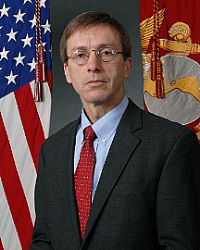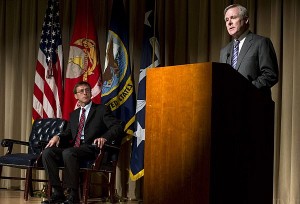 It’s rumored that Mr. Sean Stackley, the long-serving, low-profile Assistant Secretary of the Navy for Research, Development and Acquisition, is contemplating exit strategies. Passed over for Navy Undersecretary, and with Sequestration eating away the research budget, big and ugly first-in-class problems looming for both the Ford Class CVN and the DDG-1000, the F-35…and the festering sore that is the next-gen LCS/Frigate, only a masochist would want to stay.
It’s rumored that Mr. Sean Stackley, the long-serving, low-profile Assistant Secretary of the Navy for Research, Development and Acquisition, is contemplating exit strategies. Passed over for Navy Undersecretary, and with Sequestration eating away the research budget, big and ugly first-in-class problems looming for both the Ford Class CVN and the DDG-1000, the F-35…and the festering sore that is the next-gen LCS/Frigate, only a masochist would want to stay.
But the bookish Assistant Secretary is not going to rush for the exit. My sense is that Mr. Stackley’s departure won’t come before early 2016, when Mr. Stackley finally beats Franklin D. Roosevelt’s long-standing record tenure as Navy Assistant Secretary–about seven and a half years.
For an Assistant Secretary, 7.5 years is a long time, and it’s worth taking a few moments to consider Mr. Stackley’s legacy (you know, before Mr. Stackley takes a few months off and is drafted into a higher-level DoD post in some new Administration!).
America’s Fleet is the Fleet Mr. Stackley bought:
Navalists can quibble over the procurement choices made during Mr. Stackley’s tenure all day long. But on the industrial base side, Mr. Stackley has made good use of what funds he was given, positioning America–as best he could–to counter an emerging China or other slow-developing maritime challenge.
Mr. Stackley tried to provide everybody in the business with viable options so they could live to fight another day, leaving, essentially, a functional (albeit a very weak, over-capacity and almost-mothballed) industrial backbone–that could, if sufficiently funded, grow quickly to support a rapid uptick in demand.
Naturally, some sectors have done better than others. One of Mr. Stackley’s crowing achievements has been in tending the sub production line. America’s undersea platform industrial base is perfectly placed for rapid growth. Remember the sturm and drang that the Trident Program unleashed as it got going? In conjunction with the Los Angeles Class build-up? Remember the labor disputes? The poor quality? The near collapse of Electric Boat? That won’t happen as SSBN(X) starts up (sure, labor access and ramp-up is always a challenge, but the sub industrial base is far more prepared now).
As for Mr. Stackley’s legacy, it all depends upon just when (or if) China decides to become a belligerent player on the open seas, and when (or if) China starts being perceived by the public as a direct threat to the United States.
If the transition from non-threat to threat is relatively slow in developing, Mr. Stackley will be a hero for maintaining America’s naval industrial base. It the threat doesn’t materialize, Mr. Stackley will be fondly remembered for his skill at keeping the industry afloat for as long as he did.
But…If relations with China remain peaceful for, say, another five years, only to deteriorate suddenly, then Mr. Stackley’s legacy will not be a positive one.
The question for historians will be whether Mr. Stackley’s legacy of providing “viable” (if not totally palatable) industrial base options was the appropriate route. Given the strategic challenges, a more Lehman-like confrontational approach might have been better (which is something that should be worth discussing if when Mr. Stackley is nominated for higher office).
Anyway, it all may have been out of Mr. Stackley’s capable hands–such a tactic would have demanded gutsy leadership, and would have only worked with some top-cover from higher-level folks in DoD and the Administration (and they certainly didn’t want to pick a fight).
Precipitating an industrial base crisis–where a large component of the shipbuilding industrial base might need to be sacrificed–would have been a far more risky route, but, that said, an industrial base crisis might have pushed the American taxpayer (and Congress) to better understand the potentially ugly geopolitical challenges out there–and spur them to take adequate measures to prepare for a longer term strategic challenge.
Or not.
My sense is the Nation will miss Mr. Stackley’s option-laden care-taker approach. And I suspect, that after such a long and behind-the-scenes tenure, the Defense community has long taken Mr. Stackley for granted.
Industry has about a year to prepare for Mr. Stackley’s departure, and they’d be wise to start right now. It’s going to be a particularly rough ride when Mr. Stackley finally does retire, and–mark my words–the tenure of Mr. Stackley’s replacement will be nasty, brutish and short.


